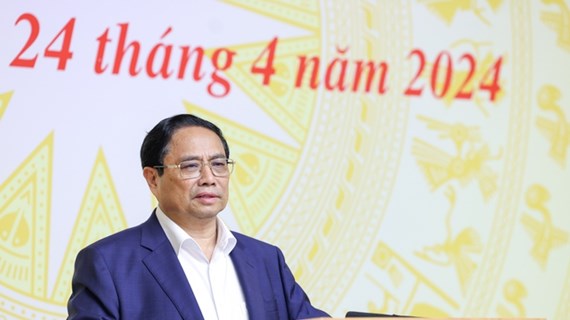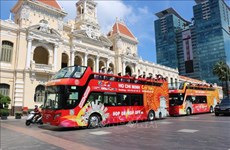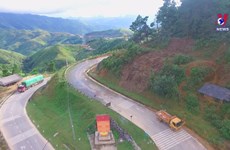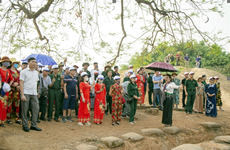First roadmap for tourism’s engagement in fourth Industrial Revolution devised
 Digital transformation sometimes starts with a smartphone. (Illustrative image. Photo: VietnamPlus)
Digital transformation sometimes starts with a smartphone. (Illustrative image. Photo: VietnamPlus)
Hanoi (VNA) – The Vietnam National Administration of Tourism (VNAT) has, for the first time, issued a plan on the active engagement into the fourth Industrial Revolution towards 2045.
Digital transformation – vital factor
Under the plan, the tourism sector will focus on developing smart tourism on the foundation of researching and applying new technologies, including those to modernise tourism infrastructure and equipment, and help accommodations to save energy, resources and enhance productivity.
Censoring technology will be invested to serve security activities and improve tourists’ experiences in tourist destinations, while helping promote Vietnamese tourism.
Nguyen Thanh Binh, Vice Chairman of the People’s Committee of the central province of Thua Thien-Hue, one of the four localities chosen for developing smart tourism, said that the COVID-19 pandemic has posed negative impacts on the tourism sector. In order to recover and boost development, the sector should adjust its growth strategy.
“Digital transformation, or the strengthening of digital technology in tourism development, is one of the vital factors contributing to the sector’s growth,” said Binh.
 Tourists experience digital tourism through the app (Photo: VietnamPlus)
Tourists experience digital tourism through the app (Photo: VietnamPlus)According to the official, Thua Thien-Hue will focus on building and developing smart city services, with the increase of application of IT products to support and deal with issues of public concern such as transport, tourism, health care, and culture.
Initially, the province will focus on setting up smart management and operations in State agencies and businesses, while giving a smart experience to tourists.
At the National Conference of Tourism in 2020 held in Quang Nam in late December, Vice Chairman of the People’s Committee of Ho Chi Minh City Le Thanh Liem underlined the need to cooperate in tourism development towards the optimising of digital technology in a professional manner. It is necessary to concentrate on in-depth development, ensuring the efficiency and quality, affirming the trademark and competitiveness of each locality with the fourth Industrial Revolution, he said.
New roadmap for Vietnamese tourism
The plan on the active engagement into the fourth Industrial Revolution that the VNAT has issued clarified the necessity to build breakthrough policies in developing smart and digital tourism, while calling on ministries and sectors to work out and implement comprehensive policies to expand smart and digital tourism at the national scale.
The VNAT will design and develop a project to develop digital tourism, along with short and long-term plans towards 2045 to complete tasks of developing digital tourism.
The 25-year road map highlighted the mission to develop a digital database of Vietnamese tourism and strengthen the application of achievements of the fourth Industrial Revolution to improve the experience of tourists and upgrade communication channels on the foundation of the VNAT.
It also sets out to build software serving the organisation of online conferences, developing digital platforms with information connecting to support the management of the State over tourism of localities.
Leaders of the VNAT have asked their agencies to focus on promoting digital transformation to match other plans, while using domestic and foreign resources to complete their tasks.
With a computer and Internet connection, a person can “travel” around the world through the screen and seek unlimited information on tourism.
 (Illustrative image. Source: VietnamPlus)
(Illustrative image. Source: VietnamPlus)Along with the development of the IT infrastructure of the VNAT, a smart destination management model will be built and applied to four localities - Hanoi, Thua Thien-Hue, Da Nang, and Ho Chi Minh City.
At last, after years of preparations, the VNAT has managed to design its own roadmap and deepen its engagement into the Fourth Industrial Revolution, as according to Deputy Prime Minister Vu Duc Dam, tourism is an important sector providing fast transformation./.













